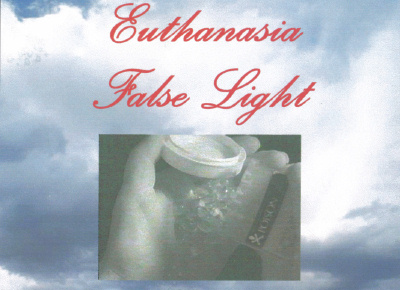VERMONT DOCTOR-PRESCRIBED SUICIDE PROPOSAL (H. 274)
H. 274, the Vermont proposal titled “An Act Relating to Patient Choice and Control at the End of Life,” is an assisted-suicide bill patterned on Oregon’s law permitting doctor-prescribed suicide.
This proposal comes at a time when Vermont already has a suicide rate that is far above the national average with 6 suicide deaths for each death by homicide. (1) In addition, national studies document that about 1 in 20 elderly people are victims of elder abuse. In Vermont this translates into 3,750 probable new cases a year, more than half caused by family members. (2) This may account for the fact that elderly Vermont residents have the state’s highest suicide rate. (3)
If passed, H.274 will transform the crime of assisted suicide into a medical treatment.
ANALYSIS
• H. 274 gives the illusion of “choice.” Yet, it will actually constrict patient choice.
Under H. 274, before writing a prescription for death, a doctor must fully “inform” the patient of “all feasible end-of-life services, including comfort care, hospice care, and pain control” [§ 5280 (7) (E) and § 5282 (3) (E)]. In addition, if the patient is not receiving hospice care at the time the patient makes the written prescribed-death request, the patient is to be referred for a “palliative care consultation” [§ 5285]. However, being “informed” of all options or undergoing a palliative care “consultation” does not mean that patients will have access to all options. It only means they must be informed of those.
If doctor-prescribed suicide becomes just another treatment option, and a cheap option at that, the standard of care and provision of health care changes. There will be less and less focus on extending life and eliminating pain, and more and more focus on the “efficient” treatment option of death.
Ten percent of Vermont residents currently have no health insurance. (4) Furthermore, even those who have health care coverage may find that their insurance carrier will not cover the end-of-life services that their doctor has explained to them but, instead, will pay for those patients to receive a prescription for death.
• H. 274 would give government bureaucrats and profit-driven health insurance programs the opportunity to cut costs by denying payment for more costly treatments while approving payment for assisted suicide.
This has already been documented in Oregon – the state on which Vermont’s bill is based. In Oregon, the Oregon Health Plan (OHP) has notified some patients that medications prescribed to extend their lives or improve their comfort level would not be covered, but that the OHP would pay for a prescription for death. (5)
Referring to payment for assisted suicide, the Oregon Department of Human Services explains, “Individual insurers determine whether the procedure is covered under their policies, just as they do any other medical procedure.” (6)
• H. 274 would allow health care providers and others to suggest and encourage vulnerable patients to request doctor-prescribed suicide, setting the stage for elder abuse and pressure on vulnerable patients.
H. 274 does not prohibit anyone from suggesting, encouraging, pressuring – or even forcing – a patient to die by doctor-prescribed suicide. While other assisted-suicide proposals (and even Oregon’s law) contain very specific penalties for “coercion,” (7) Vermont’s proposal does not.
Since victims of domestic abuse, including elder abuse, are extremely vulnerable to persuasion from their abusers, it takes little imagination to understand how H. 274 could be manipulated to pressure an at-risk patient into requesting doctor-prescribed suicide or taking the lethal drugs after they are prescribed.
In H. 274, the only reference to the patient freely making a decision is in conjunction with the statement of witnesses. Witnesses to the patient’s written request for assisted suicide must affirm that the patient “appeared to understand the nature of the document and to be free from duress or undue influence at the time the request was signed” (8) [§ 5281 (2) (c) and § 5296 Affirmation of Witnesses (1)(c)]. The witnesses may be total strangers who don’t know the patient. Victims of elder abuse and domestic abuse are unlikely to share their fears with outsiders or to reveal that they are being pressured by family members to “choose” assisted suicide.
• H. 274 would permit assisted suicide prescriptions for mentally ill or depressed patients.
Before receiving a prescription for death, patients do not need to have any psychological or psychiatric evaluation unless a doctor thinks that the patient is suffering from a mental disorder or disease, including depression, that is causing impaired judgment. [§ 5284] Even if a counseling referral is made, it consists of only one consultation between the patient and a psychiatrist, a psychologist or a clinical social worker. That consultation is only to determine if the patient “has capacity” and does not have “impaired judgment.” [§ 5280 (4)]
Even if the counselor determines that the patient has a mental disorder or disease, the prescription for suicide could still be written as long as the counselor determines that the patient’s judgment is not impaired.
This provision is the same as that contained in Oregon’s law where, in one year, not a single person – out of the 59 assisted-suicide deaths reported for that year – was referred for counseling. (9) A study about the Oregon law found that it “may not adequately protect all mentally ill patients.” (10)
• H. 274 has no safeguards for the patient at the time the lethal drugs are taken.
H. 274 addresses only those activities up until the time the prescription for death is written by the doctor. There are no provisions to insure that the patient is competent at the time the overdose is taken or that the patient knowingly and/or willingly takes the lethal drugs.
Due to this lack of protection at the time of their deaths, H. 274 would put patients at enormous risk. Someone who would benefit from the patient’s death, for example, could coerce or trick the patient into taking the fatal drugs, and no one would know that the patient’s death was not voluntary.
• H. 274 would allow drugs for suicide to be delivered to the patient by a third party.
Nothing in H. 274 requires the patient to obtain the drugs in person. A pharmacist
can give the lethal drugs to a friend or acquaintance for delivery to the patient.
[§ 5282 (13)]
• H. 274 would allow doctors to prescribe death for patients who could live for many years.
Under H. 274, doctors can prescribe assisted suicide to patients who have a “terminal condition,” which is defined as “an incurable and irreversible disease which would, within reasonable medical certainty, result in death within six months.” [§ 5280 (12)]
However, that definition does not require that the patient is expected to die within six months, even with medical treatment. Therefore, it is possible that a patient could be considered “terminal” for the purpose of qualifying for assisted suicide even if, with medical treatment, the patient could live much longer.
For example, diabetes is both incurable and irreversible. An insulin dependent diabetic patient who stops taking insulin will, within reasonable medical certainty, die within six months. Thus, under H. 274, diabetic patients could be eligible for assisted suicide even though they could live virtually normal lives with insulin.
• H. 274 would force facilities to permit prescriptions for assisted suicide to be written on their premises.
Under the “Health Care Facility Exception,” a facility “may prohibit an attending physician from writing a prescription” for assisted suicide for a patient “who is a resident in its facility and intends to use the medication on the facility’s premises.”
[§ 5295 (emphasis added)]
Therefore, facilities may not stop doctors from writing a prescription for assisted suicide on the premises if the doctor believes the patient will actually take the lethal overdose off the premises.
• H. 274 would permit patients to request assisted suicide within days after “moving” to Vermont.
H. 274 states that only residents of Vermont would be eligible for assisted suicide.
[§ 5280 (9)] A Vermont voter’s registration may be used to prove residency.
[§ 5282 (2) (B)]
One can register to vote in Vermont immediately after having a Vermont address. There is no required time that must elapse before one becomes a resident. According to the VT Secretary of State’s office, “This means that it is the voter’s intent and action that determines residency, not how many nights a year the voter sleeps in town.” (11)
• H. 274 contains “findings” that are inaccurate and misleading.
For example, one “finding” (no. 5) states: “Some terminal diseases, such as bone cancer, inflict untreatable agony at the end of life.”
This statement is inaccurate and does a grave disservice to patients. If that finding is believed, a person diagnosed with bone cancer might request doctor-prescribed suicide as the only way to avoid “untreatable agony.”
In fact, according to pain control experts, “The pain of cancer in the bone, like other pain due to cancer, is eminently treatable. To call this bone pain ‘untreatable agony’ is flat out wrong. In fact, bone pain can respond to specific treatments not available to other sites of cancer. For example, one treatment involves a one-time injection into the bone with a substance. It can result in dramatic and long-lasting pain relief, often within minutes.” (12)
[1] CDC, National Vital Statistics Reports, Apr. 24, 2008.
[2] Vermont Center for Crime Victim Services. See: http://www.ccvs.state.vt.us/pub_ed/index.html (last accessed 2/24/11).
[3] “Vermont Suicide Prevention Fact Sheet,” Suicide Prevention Resource Center, available at: http://www.sprc.org/stateinformation/PDF/statedatasheets/vt_datasheet.pdf (last accessed 2/14/11).
[4] “Vermont – Kaiser Health Facts,” available at: http://www.statehealthfacts.org/profileglance.jsp?rgn=47# (last accessed 2/24/11).
[5] KATU Television, “Letter noting assisted suicide raises questions.” (Interview about one such case and the response of the Oregon Health Plan. Available at: http://www.katu.com/news/26119539.html (last accessed 2/28/11).
[6] Oregon Dept. of Human Services, “FAQs about the Death with Dignity Act.” Available at: http://www.oregon.gov/DHS/ph/pas/faqs.shtml (last accessed 2/28/11).
[7] ORS 127.790 (2) A person who coerces or exerts undue influence on a patient to request medication for the purpose of ending the patient’s life, or to destroy a rescission of such a request, shall be guilty of a Class A felony. (No similar provision in VT proposal.) Only in reference to witness statement (§ 5281 (c)) and in the actual witness statement is there a reference: (§ 5297) Affirmation of witnesses: Witnesses affirm that the person signing the request “appears to understand the nature of the document and to be free from duress or undue influence at the time the request was signed” (emphasis added)
[8] Emphasis added.
[9] Official report of Oregon’s Death with Dignity Act available at: http://www.oregon.gov/DHS/ph/pas/docs/year10.pdf?ga=t (last accessed 2/28/11)
[10] Linda Ganzini, Elizabeth R. Goy, Steven K. Dobscha, “Prevalence of depression and anxiety in patients requesting physicians’ aid in dying: cross sectional survey,” British Medical Journal, Oct. 25, 2008, pp. 973-978.
[11] Vermont Secretary of State, “Everything you need to know to vote in Vermont.” Available at: http://www.vermont-elections.org/elections1/register_faq.html#Who%20is%20a%20resident%20for%20voting%20purposes (last accessed 2/28/11).
[12] Eric Chevlen, M.D. written communication about H. 274 finding No. 5, 2/24/11. Dr. Chevlen is one of few physicians in the United States who is board certified by five specialty boards – Internal Medicine, Medical Oncology, Hematology, Pain Medicine, and Hospice and Palliative Medicine. For a more thorough discussion of pain alleviation for patients with bone cancer, see: Eric M. Chevlen and Wesley J. Smith, Power over Pain: How to Get the Pain Control You Need, International Task Force (2002).
Patients Rights Council
http://www.patientsrightscouncil.org
740-282-3810 or 800-958-5678
P.O. Box 760
Steubenville, OH 43952
3/2/11




